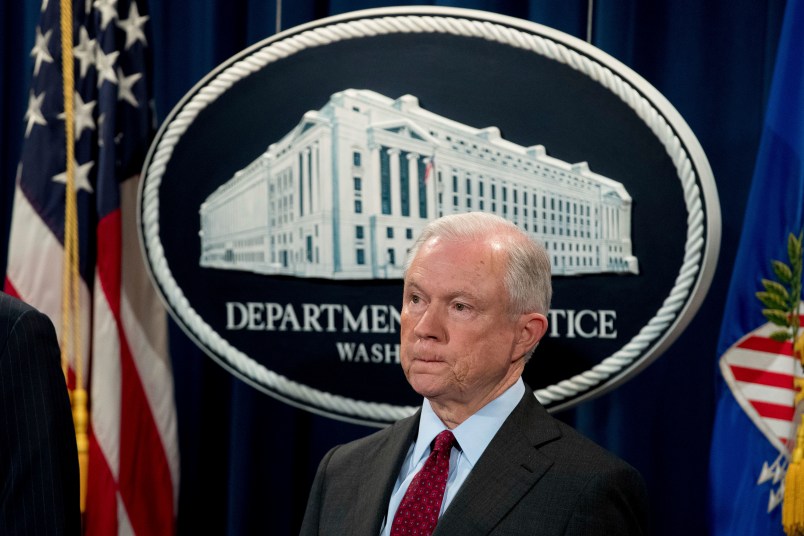Reports this week that the front office of the Civil Rights Division under Attorney General Jeff Sessions would be running a project to investigate universities whose affirmative action policies purportedly discriminate against white students brought a chill that was all too familiar for some former Justice Department officials.
These former officials warned that a direct line could be drawn from the politicized hirings that got the division in trouble during the George W. Bush administration to a reported internal job posting that requested division attorneys interested in working on “investigations and possible litigation related to intentional race-based discrimination in college and university admissions” submit their resumes by Aug. 9.
John Dunne, assistant attorney general for civil rights under George H.W. Bush, told TPM that the situation was a “duplicate of what happened in the Bush II administration, when the front office, which was totally politically motivated, disregarded professionals’ opinion on issues when it came to initiating litigation.”
Former officials sounded the alarm that the Trump administration appeared to be taking the reins away from career civil servants who typically handle such investigations and refer cases. Political appointees often reside in what colloquially is known as the “front office” and come and go with administrations; the New York Times and Washington Post reported that the front office was handling the project on affirmative action programs.
So far, the DOJ has confirmed only that it is reviewing a 2015 complaint alleging that Harvard University discriminates against Asian-American students.
“If there is sufficient evidence that there is discrimination against Asians or other groups, the section should look into it,” Dunne said. “What I’m concerned about is that this investigation is really being initiated more by the Attorney General and the White House and political decisions, rather than something [else] that should have more attention.”
At least four other former officials in the civil rights division interviewed by TPM agreed that any discrimination against students based on race should be investigated, but that the decision to do should be based on strong evidence found by the career attorneys in the Education Opportunities Section who specialize in that work. They cautioned that admissions discrimination against white or Asian students by race is exceedingly rare, and that only career staffers should also be assigned to work on any relevant investigations that may crop up.
The Post reported that a number of career staffers specializing in education issues refused to work on the project, prompting the front office to take control of it themselves.
“The fact that the front office would be staffing this and doing it by looking at resumes is a big red flag,” Justin Levitt, deputy assistant attorney general in the civil rights division under Obama, told TPM. “When I was in the Justice Department, I staffed precisely zero cases by asking for resumes and I saw precisely zero cases staffed by looking at resumes.”
Explaining that case assignments typically come down to interest, time, experience, and the recommendations of section managers, Levitt said “you don’t need resumes for any of that.”
“You need resumes if what you really want is to check out where they might have worked before, or what clubs they were part of when they were in law school, all sorts of things that are not proper considerations for making case assignments,” he continued.
The DOJ did not address specific questions from TPM as to which staffers would oversee the review of the Harvard case, which was filed by a coalition of 64 Asian-American associations in 2015 and left unresolved by the Obama administration.
“The posting sought volunteers to investigate one administrative complaint filed” by those associations, DOJ spokeswoman Sarah Isgur Flores said in a statement.
“This Department of Justice has not received or issued any directive, memorandum, initiative, or policy related to university admissions in general,” the statement continued. “The Department of Justice is committed to protecting all Americans from all forms of illegal race-based discrimination.”
During the George W. Bush years, political appointees assumed an expanded role in hiring staff and brought on conservative attorneys who often had little experience working in civil rights law; they were ultimately reprimanded in a report by the DOJ inspector general. Earlier this year, civil rights groups raised similar concerns after conservative legal activists sent Sessions a letter urging him not to leave hiring to “career bureaucrats who are reliably opposed to President Trump’s agenda.”
Affirmative action critics, several of whom signed that letter, said that they were unbothered by comparisons to the Bush era.
“It’s no surprise that this change in policy has to be done by the front office since these rather radical lawyers in the civil rights division would not move forward as the President and the Attorney General want to do,” said William Perry Pendley, president and CEO of the Mountain States Legal Foundation, which has advocated against affirmative action policies since the 1980s.
“The DOJ, particularly the Civil Rights Division, has become intensely partisan,” said John Eastman, a member of the U.S. Commission on Civil Rights during the Reagan administration. “I see this as a very salutary development, one designed to yield enforcement priorities in line with the results of the last election—as it should be.”
Former division staffers disputed that characterization, telling TPM that back-office employees span various administrations and tend to be law enforcement types who do the work they are assigned to carry out even if they disagree with it personally.
For now, Trump’s civil rights division seems to be looking at the Harvard case alone. But advocates on both sides of the aisle believe that’s just a first step.
Roger Clegg, a former top official in the civil rights division during the Reagan and George H. W. Bush administrations, expressed “hope” that this “long overdue” look at affirmative action policies “will not be limited to just one case, but will be undertaken in a more systematic matter.”
Given the views that Sessions, Trump, and Secretary of Education Betsy DeVos have voiced on the subject, that seems to be a solid prediction.







Go ahead Beauregard just say it

The red flag was when Jefferson Beauregard Sessions III was appointed Secretary of the Department of Justice. There is nothing he does that is not politically motivated in one way or another. And it should surprise no one that he’s working his way down the white supremacist wish list.
Trolling Liberals–Last refuge of the Impotent Incompetents.
Speaking of which… that rally last night WTF?
Last stand of the knuckle draggin’ Faux nooze watchin’ white trash.
**Lock her up !**Lock her up ! Seriously?
Extreme trolling indeed
We need to get Mueller protected from being fired by trump and then take down Sessions. It irritates me that, for the moment, it is best to leave him be. He needs to go, and stat.